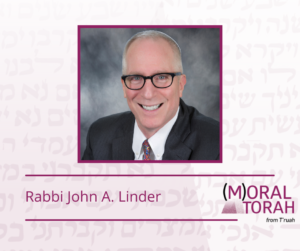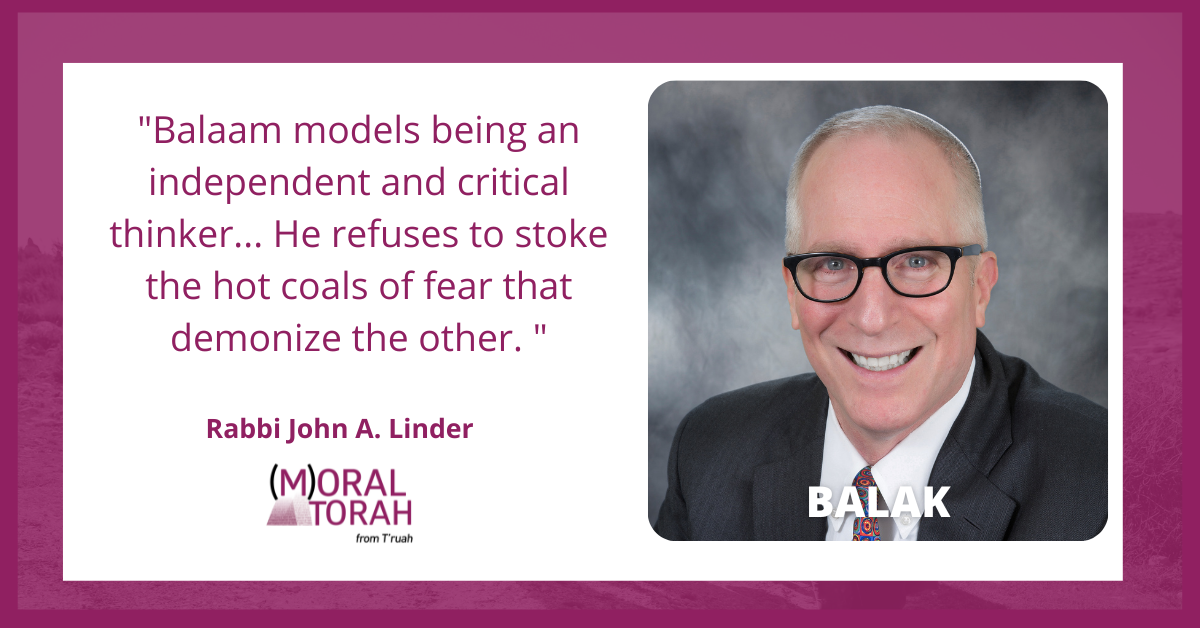A D’var Torah for Parshat Balak by Rabbi John A. Linder
The non-Israelite prophet Balaam, whom we meet in this week’s Torah portion of Balak, serves as a role model to counter our current culture of demonizing the other.
Here’s the biblical context: The Moabite king Balak, though he had never personally met an Israelite, was deathly afraid of them. Word was out, as the Israelites were passing through what is now Jordan on their way to Canaan, that they should be feared. “This horde,” the Moabites rumored, “will lick clean all that is about us, as an ox licks up the grass of the field.” The Israelites appeared to the Moabite king as so numerous that Balak says to his messengers, “It hides the earth from view, and it is settled next to me.” Balak gives voice to the ancient fear-mongering trope that is alive and well today: There are lots of them; they are seen as “it,” more of an object than a human being; they are different from us; they are dangerous; and they are moving next door.
Sign up to receive (M)oral Torah in your inbox each week.
Balak sends his messengers to enlist the prophet Balaam, carrying these words: “Put a curse on this people for me, since they are too numerous for me; perhaps I can thus defeat them and drive them out of the land. For I know that he whom you bless is blessed indeed, and he whom you curse is cursed.” The Moabite king is so blinded by his fear and hate that he can’t see any choice beyond cursing the Israelites.
What about Balaam? Is he free to make an independent decision, to choose between the Moabite king and the King of Kings? Balaam is crystal clear on the first. He consistently tells Balak that he is not beholden to any earthly king. Even when offered a king’s ransom, the prophet can’t be bought. Balaam explicitly tells the king he will only follow God’s command, only utter the words that God puts in his mouth. Which, to Balak’s chagrin, the prophet does – twice blessing the Israelites.
Then something extraordinary happens. We witness Balaam evolve before our eyes. In three scenes, Balaam is called on to curse the people, yet he blesses them each time. For the first two blessings, the Moabite king took Balaam to a place where “he could (only) see a portion of the (Israelite) people.” In other words, Balaam had an obstructed view. Balak was hoping this might make it easier for the prophet to curse a people he didn’t know and couldn’t properly see. Regardless, channeling God’s words, Balaam still offered a blessing. Yet here’s the point: It really wasn’t Balaam’s blessing; it was God’s.
For the first two blessings, Balaam separated himself, seeking omens for what he was supposed to say. For the third blessing, Balaam trusted his own spiritual grounding, at once able to draw strength from God’s spirit, while having confidence in his own voice. No more omens, no more divine dictations. Now, in a different place, with a new perspective, Balaam “turned his face toward the wilderness.” (Numbers 24:1) Balaam’s view is no longer obstructed. “He looked up and saw Israel encamped tribe by tribe, and the spirit of God came upon him.” This is Balaam’s blessing: “Word of Balaam son of Beor, Word of the man whose eye is true… Mah tovu ohalecha Yaakov, mish’knotecha Yisrael/How fair are your tents, O Jacob, Your dwelling places, O Israel.” (Numbers 24:5)
Find more commentaries on Parshat Balak.
For the first time, Balaam bears witness to the Israelite community. He sees them as families relating kindly with one another. The sages imagine “that Balaam was moved to praise the tents of Jacob because the arrangement of their tents made it impossible for a family to see inside the tents of others, showing respect for privacy.” (Babylonian Talmud, Bava Batra 60a) Balaam’s blessing now flows from firsthand experience.
 Balaam models being an independent and critical thinker. He refuses to be blinded by stereotypes, whether they diminish or inflate. His relationship with God is deepened by exercising his agency in the world. He refuses to stoke the hot coals of fear that demonize the other.
Balaam models being an independent and critical thinker. He refuses to be blinded by stereotypes, whether they diminish or inflate. His relationship with God is deepened by exercising his agency in the world. He refuses to stoke the hot coals of fear that demonize the other.
The Moabite king’s view was obstructed, such that he couldn’t imagine any choice other than cursing the Jewish people. Imagine how the biblical narrative would have been transformed had he the capacity to choose blessing over curse. Like Balaam, may each of us turn our faces toward the wilderness, setting our sight on the expansive horizon of seeing the best in the other. Blessed are those that bless others. What goes around comes around.
Rabbi John A. Linder serves as Senior Rabbi of Temple Solel in Paradise Valley, Arizona.


